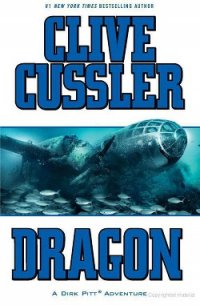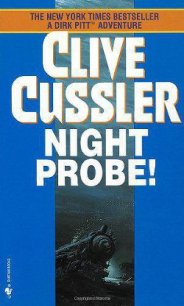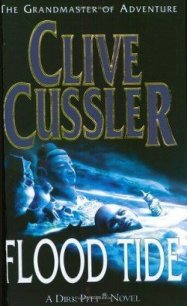Black Wind - Cussler Clive (книги полностью бесплатно txt) 📗

Жалоба
Напишите нам, и мы в срочном порядке примем меры.
Black Wind - Cussler Clive (книги полностью бесплатно txt) 📗 краткое содержание
Black Wind читать онлайн бесплатно
DIRK PITT 18: BLACK WIND
PROLOGUE
Japanese Imperial submarine I-403 and Seiran float plane December 12, 1944 Kure Naval Base, Japan Lieutenant Commander Takeo Ogawa glanced at his wristwatch and shook his head in irritation.
“Half past midnight already,” he muttered anxiously. “Three hours late and still we wait.”
A young ensign staring through the glazed eyes of a sleep-deprived insomniac nodded slightly at his superior's grieving but said nothing. Waiting atop the conning tower of the Japanese Imperial Navy submarine i-403, the two men gazed across the naval yard searching for signs of a pending arrival. Beyond the expansive naval base, a haphazard twinkling of nighttime lights glistened about the scenic Japanese city of Kure. A light drizzle fell, lending an eerie tranquility to the late hour, which was broken by the distant sounds of hammers, cranes, and welding torches. Repairs to enemy-damaged ships and new vessel construction persisted around the clock in other parts of the shipyard, in a futile rush to aid the increasingly bleak war effort.
The distant whine of a diesel truck soon echoed across the water.
the sound rising in intensity as the vehicle approached the submarine docks. Rounding the corner of a brick warehouse, a slate-colored Isuzu cargo truck rumbled into view and turned along the wharf. The driver inched his way cautiously toward the submarine's pen as he struggled to make out the edges of the darkened pier, barely visible under the truck's wartime-blackened headlights. Pulling alongside a large gangplank, the truck ground to a halt as its worn brakes squealed loudly in protest.
A moment of silence ensued, then six heavily armed soldiers sprang from the truck bed and enveloped the vehicle in a perimeter guard. As Ogawa made his way down from the conning tower to the dock, he sensed one of the guards pointing a weapon in his direction. The soldiers were no Imperial Army regulars, he noted, but elite members of the feared Kempei Tai military police.
Two uniformed men exited the cab of the truck and approached Ogawa. Recognizing a superior officer, Ogawa stood at attention and saluted smartly.
“I've awaited your arrival, Captain,” Ogawa stated with a tinge of annoyance.
Captain Miyoshi Horinouchi ignored the innuendo. As staff operations officer for the Sixth Fleet, his mind was occupied with graver matters. The Japanese submarine fleet was slowly being decimated in the Pacific and the Imperial Navy had no answer for the antisubmarine warfare technologies being deployed by the American forces. Desperate battles by the fleet's submarines against overwhelming odds inevitably resulted in the loss of crew and vessels, which weighted heavily on Horinouchi. His short-cropped hair had turned prematurely white, and stress lines creased his face like dry riverbeds.
“Commander, this is Dr. Hisaichi Tanaka of the Army Medical College. He will be accompanying you on your mission.”
“Sir, I am not accustomed to carrying passengers while on patrol,” Ogawa replied, ignoring the small bespectacled man at Horinouchi's side.
“Your patrol orders to the Philippines have been rescinded,” Horinouchi replied, handing Ogawa a brown folder. “You have new orders. You are to take Dr. Tanaka and his cargo aboard and proceed immediately per fleet directives to strike at the enemy's doorstep.”
Glancing at one of the guards holding a German Bergman MP34 submachine gun pointed in his direction, Ogawa asserted, “This is most unusual, Captain.”
Horinouchi tilted his head to the side, then took a few steps to his right. Ogawa followed, leaving Tanaka out of earshot. Speaking softly, Horinouchi continued.
“Ogawa, our surface fleet was annihilated at Leyte Gulf. We counted on a decisive battle to stop the Americans, but it was our own forces that were defeated instead. It is just a matter of time before all of our remaining resources will be assigned in defense of the homeland.”
“We will make the Americans pay heavily in blood,” Ogawa said harshly.
“True, but there is no question that they have the will to conquer, regardless of the losses. The slaughter of our own people will be appalling.” Horinouchi contemplated the sacrifice of his own family and fell silent for a moment.
“The Army has approached us for assistance in a valiant operation,” he continued. “Dr. Tanaka is affiliated with Unit 731. You will take him and his cargo across the Pacific and launch an attack on the American mainland. You are to avoid detection and protect your boat at all costs en route. Succeed, Ogawa, and the Americans will bow to a truce and our homeland will be preserved.”
Ogawa was stunned by the words. His fellow submarine commanders were waging a mostly defensive battle to protect the remnants of the surface fleet, yet he was to cross the Pacific single-handedly and launch an attack that would end the war. He might have ridiculed the idea, had it not been a fleet staff officer dictating the order to him out of desperation in the middle of the night.
“I am most honored by your confidence, Captain Horinouchi. Rest assured my crew and officers will uphold the honor to the emperor. If I may ask, sir, what exactly is Dr. Tanaka's cargo?” Ogawa inquired.
Horinouchi gazed forlornly across the bay for several seconds. “Maka^e,” he finally muttered quietly. “An evil wind.”
Under the watchful eye of Dr. Tanaka, a half-dozen oblong wooden crates were carefully loaded by the Kempei Tai guards into the forward torpedo room of the I-403 and tightly secured. Ogawa ordered the submarine's four diesel engines turned over and the deck lines released. At half past two in the morning, the iron sub nosed slowly into the inky harbor and inched its way past several other fleet I-boats docked in the yard. Ogawa noted with curiosity that Horinouchi sat silently in the darkened truck on the pier, refusing to leave until after the I-403 was well out of sight.
Creeping past the docks and warehouses of the sprawling navy yard, the sub soon approached a massive shadow looming against the darkness ahead. Lying quietly in a repair dock, the massive battleship Yamato towered above the submarine like a behemoth. With its massive eighteen-inch guns and sixteen-inch-thick armor plating, the Yamato was the most feared vessel afloat. Ogawa admired the lines and armament of the world's largest battleship as he sailed past, then felt a touch of pity toward her. Like her sister ship, the Musashi, recently sunk in the Philippines, the Yamato, he feared, was destined to find her way to the bottom of the sea before the war was over.
Gradually the lights of Kure fell away as the submarine snaked around several large islands, then entered the Seto Inland Sea. Ogawa ordered increased speed as the mountainous island outcroppings fell away and the first gray patches of predawn light tinted the eastern sky. As he marked their route in the conning tower with the I-403 navigator, Ogawa was approached by the executive officer climbing up from below.
“Hot tea, sir,” Lieutenant Yoshi Motoshita said, thrusting a small cup toward the commander. A thin man with a warm demeanor, Motoshita mustered a grin even at five in the morning.
“Yes, thanks,” Ogawa replied crisply before gulping at the tea. The hot liquid was a welcome tonic against the chilled December air and Ogawa quickly drained the cup.
“The sea is unusually calm this morning,” Motoshita noted.
“Fine conditions for fishing,” Ogawa said reflectively. The son of a fisherman, Ogawa had grown up in a small village on the southern island of Kyushu. Accustomed to a hard life on the water, Ogawa had overcome a modest background by passing the formidable entrance exams to Etajima, the Japanese naval academy. After gaining his commission, he was drawn to the growing prewar submarine force and served on two boats before attaining command of the I-403 in late 1943. Under his leadership, the I-403 had sunk a half-dozen merchant ships, along with an Australian destroyer in the Philippines. Ogawa was considered one of the top submarine captains remaining in the rapidly shrinking underwater fleet.




